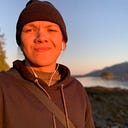how to erase native identities or something else like it
I’ve been told my whole entire life that I should be something else. I’ve been told that I should cut my hair. I’ve been told that I should be thankful to get college paid for by American taxpayers because Native people get all those resources for free. I’ve been told I should lay off the fry bread and save some for the rest of my family. I’ve been told that my tribe was too hard to pronounce and it’s easier just to say ‘Indian.’ I’ve been told that I shouldn’t talk about federal unrecognized tribes at institutions because it’s not in their interests to include them. I’ve been told my whole entire life that I should be something else.
Something else other than a Native American, Indigenous, American Indian person.
I can keep telling myself that I’m not something else and my voice matters, yet everywhere I go on settled land, there are continued messages that Native people shouldn’t be here.
On the historic election night of 2020, which had the highest voter turnout between both Democrat and Republican parties, I was excited to watch not because of the outcome, but because of the strides we’ve gained in Native voting engagement. Throughout the whole year, I’d be working to encourage more and more people to register to vote and get to the polls. I knew the Native voice was important and could easily flip states in either direction. Native people were never destined to vote, share their stories, or influence Western notions. For me, this election was an evaluation of Native peoples’ voting rights. If you didn’t know, Native people were not citizens until 1924 during the passage of the Indian Citizenship Act. They weren’t technically able to vote until the Voting Rights Act of 1965, however through a clause, the federal government allowed each state to determine whether Native people residing there had the right to vote. Native people today still face suppressions while going to the polls. Sometimes you can’t use your Tribal ID, P.O box addresses are rejected, or a pandemic hits your community and you’re unable to safely make it to the polling place and without an option to mail in. These aren’t hypotheticals; they are what Native communities face each and every election from the local to federal level.
However, what they don’t tell you, is how they continue to erase our strides, monuments, and achievements. That same election night was a traumatic portrayal of Native people. CNN decided to showcase racially sectioned exit polls across the country. Marking each race with the associated percentage of voter turnout. White, Black, Latino, Asian, and “Something Else.” Specific tribal people with ties to sovereignty, land, and intellectual property were reduced to ‘something else.’ Individuals with multiracial backgrounds were reduced to ‘something else’ and millions of people watched and consumed it without batting an eye.
Let me tell you about something else.
When Indian Agents kicked down the doors of Native people, ripping children out of their families’ arms and forcing them into boarding schools, were those Agents trying to keep the children Native, or assimilate them into something else?
Or, what about when tribes file for federal recognition and get denied, is the government trying to keep the tribe a Native American tribe, or deny them the rights as something else?
Or, what about when pipelines get built across reservations and the tribal people try to stop it, is the government denying Native rights, or just something else?
Or, what about when Native American mascots continue to be used and worn across the world, is it really honoring Native people, or is it just something else?
Or, what about when settlers took Chief Si’ahl’s name, anglicized it, and burned down his longhouse, is it upholding his identity, or is it just something else?
When a record number of Indigenous members are elected to Congress in 2020 from all across the nation, are they introduced by their nation, or as ‘something else’?
Indigenous peoples aren’t something else. We are thriving, innovative, and beautiful. We work fast to incorporate our traumas into laughable jokes and memes. Behind the scenes, Indigenous people across North America are laughing about being called ‘something else’ and making it into their own thing. We are reclaiming our own narrative because we’ve been stripped of it throughout each and every generation. Indigenous comedians keep doing your thing, keep encouraging people to laugh, because laughing is medicine and will continue to fuel this fire. However, Indigenous people, this piece isn’t for you. It’s for everyone else. Everyone who makes Indigenous culture into their own thing. Take off the headdress, remove that dream catcher tattoo, and realize your own responsibilities. Realize your actions into making Native people into just something else.
This isn’t the first time Native people have been called something else, nor will it be the last time. However, it was the first time that everyone was able to see it on a national level and it’s your fault if you continue to erase us and promote institutions that just see us as something else.
we were all wounded at wounded knee, Redbone
Happy Native American Heritage Month.
Owen L. Oliver
